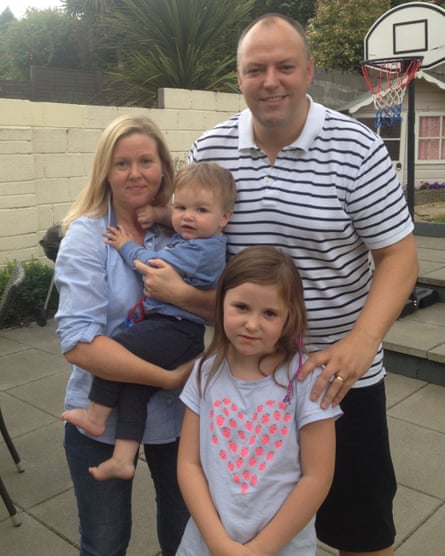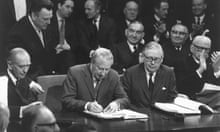Applications for both Irish citizenship and passports have soared since Britain voted to leave the European Union in June, as thousands of people seek to mitigate the effects of Brexit on their lives, government figures show.
In all, more than 37,000 people in the UK and Northern Ireland applied for Irish passports in the three months after 23 June – 83% more than for the same months in 2015.
Additionally, in the three months following the referendum, the Irish embassy in London received more than 2,800 applications for citizenship from people on the Foreign Births Register (individuals with Irish ancestry). This compares with 235 applications in the first three months of 2016. In July alone, more cases were handled than in the whole of 2015.
The number of citizenship applications from British nationals resident in Ireland has also shot up, from 61 applications in the first nine months of 2015 to 351 in the same period in 2016, a six-fold increase.
Such is the increased volume of passport applications that the Irish passport office has extended the contracts of more than 100 temporary staff for three months.
According to Office for National Statistics’ estimates for 2015, there are 332,000 Irish-born individuals living in the UK. However, the number of people who could be eligible for Irish citizenship in the UK is much greater.
Correspondence between the Irish Passport Service and the Irish Secretary General’s Office in July stated that an “initial and conservative estimate puts the number of people in GB and NI eligible for Irish citizenship and a passport … at 2.1m”, excluding those who already have citizenship.
According to the Irish Central Statistics Office, there were 117,000 UK nationals living in Ireland in mid-2015.
Such is the surge in interest that a member of Ireland’s parliament is now calling on the Dublin government to halve the cost of applying for citizenship to encourage more Britons to take Irish nationality. It costs almost €1,000 to become an Irish citizen, which is two times higher than the EU average.
Among those applying to become an Irish citizen after the Brexit vote is Michelle Heming, who has been in Ireland so long that when she returns to her native Nottingham no one outside her family believes she is English.

Married to an Irishman with two children in a prosperous part of south County Dublin, Heming said what while she would always support the England football and rugby teams, it was time for her to take up Irish citizenship.
“When we travel together, are we going to have go into different lines now? Am I going to be separated from husband and children in airports and ports? I don’t think I would have looked for Irish citizenship before Brexit but now I really would prefer no issues when I am travelling. Or what if we had to relocate due to a new job to another part of the EU? Being an Irish citizen would eliminate any hassle in employment too.
Paths to Irish citizenship
Birth or descent If you or either parent were born in Ireland (including Northern Ireland) before 2005, citizenship is automatic. If you and your Irish parent were born outside Ireland, or a grandparent was an Irish citizen born in Ireland, your birth must first be listed in the Foreign Births Register.
Residency You need 365 days of continuous residence immediately before applying, and residency totalling five out of the past nine years.
Marriage Residents are eligible after three years' marriage/civil partnership to an Irish citizen, alongside three years' residency out of the past five (including the year before applying).
“If it wasn’t for Brexit I wouldn’t give up my British passport [in fact, it is possible to hold dual nationality] as I do see myself as British. I am not Irish even though I have an Irish accent, my children are Irish and I love living here.”
In another part of south County Dublin, close to the residency of the British ambassador, Jean Gargan Smith and her English husband are getting his citizenship application ready.
Dave Smith, who works as a manager for a biopharmaceutical company in Ireland, spends a lot of time travelling, including one week a month in the United States at his employer’s headquarters.
“After our second child was born Jean and I did discuss me applying for Irish citizenship but after the Brexit vote I became convinced I need to do so now. It highlighted the issue again. We were on holiday when the Brexit result was announced and we were shocked at the outcome. I still find it hard to believe to this day that the UK is heading out of the EU,” he said.
Like Michelle Heming, Smith has concerns about both work trips and family holidays, and the possibility of being separated from his wife and children at airports.
Smith, who comes from Derbyshire, feared Brexit would make it more complicated for those like him still having to travel on a UK passport.
“With an Irish passport I can travel freely on business anywhere around Europe. I am one of the unlucky ones as my ancestors emigrated in the 19th century to Australia and eventually returned to Britain. They were originally from Ireland but their roots are too far back for me to claim automatic citizenship. So there is only one route I have to take and that is to apply to become an Irish citizen.”
The process is not quick. Gargan Smith has been told it could take up to 12 months.

It’s not just Britons living in Ireland who are thinking of applying for citizenship. Expatriates living in France and Spain are making inquiries too, according to department officials.
Aside from the backlog in applications following Brexit, the other barrier in the way of Irish citizenship for Ireland’s Brits is the cost. At €975 Ireland, alongside Austria, is the most expensive place in the EU to apply to become a citizen.
Senator Neale Richmond from the ruling Fine Gael party, who knows the Gargan Smith family, is campaigning to halve the fee. “We have to make it easier for people to become Irish citizens and that has to start with the cost,” he said. “It is in our economic interest to encourage people like Dave and others in the same situation to become full citizens of this state.
“The current fee is exorbitant and we should be doing everything we can to encourage tax-paying, wealth-generating, talented people living in Ireland from countries like Britain to become fully fledged Irish citizens,” Richmond said.
British citizens living in the Irish Republic are strictly speaking not “non nationals” under Ireland’s immigration laws. Thanks to the pre-EU Common Travel Area there is unique freedom of movement for Irish and British people between the two islands.
The 380,000 Irish people in the UK are also not considered to be from a foreign country under British law.










Comments (…)
Sign in or create your Guardian account to join the discussion